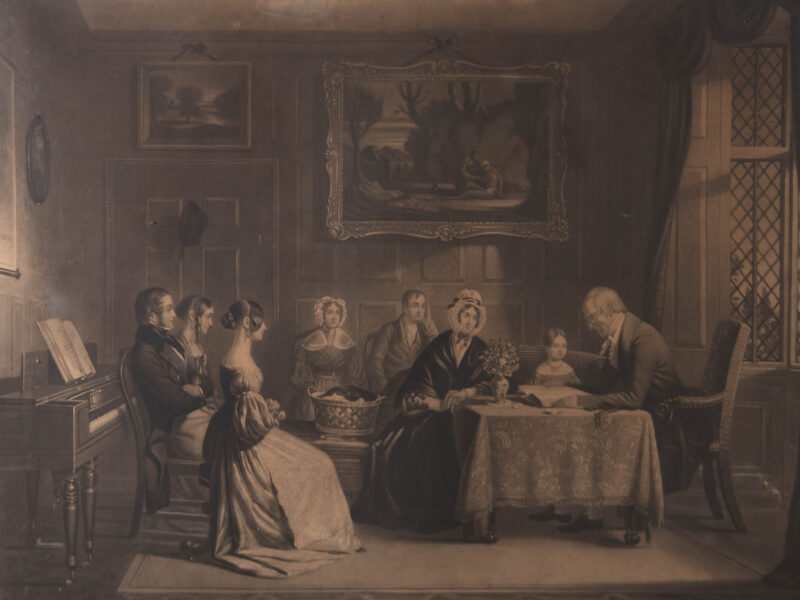When my review of Stephen Wolfe’s The Case for Christian Nationalism was published, Fr. Ben Jefferies—a former member of the Liturgy Task Force of the Anglican Church in North America, and a once frequent contributor to The North American Anglican who cut ties after my review was not retracted—posted a comment calling both the book and the review “garbage,” describing the review in particular as “unconscionable” on the basis that it did not “critically mention [Wolfe’s] Kinist-but-you-can’t-katch-me comments on pp.135-145.” This comment was taken down not because it disagreed with the book and the review, but because it vituperatively failed to engage with the substance of both. Since then he has suggested that my review was “ill-advised and insufficiently critical,” and that in allowing it to stand without apology TNAA has declared that “Kinism is on the table, folks.”
Given that virtually every other review of the book prior to mine—to say nothing of the online discussion of the book before its release—had already focused extensively on the subject of race and ethnicity, and given that the book’s author had already acquitted himself in public comments of anything untoward in this regard, I chose to focus my own review on other points of interest. Since it is felt that the topic needs to be addressed, however, I will now make clear that Wolfe’s book does not promote kinism at all. In fact, his account of ethnicity positively excludes kinism.
The first step in understanding how this is so is to define the word “kinism.” Kathryn Joyce, an investigative reporter at Salon, writes that kinism is “a movement of anti-immigrant, ‘Southern heritage’ separatists who splintered off from Christian Reconstructionism to advocate that God’s intended order is ‘loving one’s own kind’ by separating people along ‘tribal and ethnic’ lines to live in large, extended-family groups.”[1] A report from the Anti-Defamation League says kinists “assert that whites have a ‘God-given right’ to preserve their own kind and live separately from other races in their own communities. Kinists declare that the social order for man is based on ‘tribal and ethnic’ (by which they mean racial) ties.”[2] The Southern Poverty Law Center defines kinism as “a new strain of racial separatism that wants America broken up into racial mini-states.”[3] According to a statement written by avowed kinists (quoted in the ADL report), kinism is “the belief that the love of racial or ethnic kin is similar to that of family ties,” and that “God has divided humanity into ‘nations,’ which may be properly translated as races or ethnicities.”[4] Finally, Tribal Theocrat, a kinist website, says one of the tenets of kinism is that “a nation is a large group of people of common patrilineal descent, living in a common geographical location, and having a shared religion, history, language, and civil government (a religio-ethnostate).”[5]
There are two key features of kinism mentioned in these definitions: first, each tribe, people, or nation consists of a single extended-family group. This means that in a kinist society every single member would be related by blood—that is to say, they would be “kin”—to every other member, hence the name “kinist.” Second, each people is composed of a single ethnicity or race, and ethnicity and race are treated as synonymous. Part of the reason Wolfe has been so widely taken for a kinist is that he talks a great deal about the importance of kin in his conception of ethnicity. However, to speak well of “kin” does not make one a kinist, as we shall see shortly. But first, some general remarks on Wolfe’s understanding of ethnicity.
Wolfe’s Account of Ethnicity
Wolfe defines “ethnicity” phenomenologically as “familiarity with others based in common language, manners, customs, stories, taboos, rituals, calendars, social expectations, duties, loves, and religion.” In other words, what makes a people-group a people-group is that they “have the same world—sharing the same or very similar topography of experience—which makes possible the full range of human cooperation, activities, and achievements, and a collective sense of homeland” (136). The centrality of “shared experience” in Wolfe’s conception of ethnicity can be seen when he talks about how one can discern one’s own ethnicity:
Reflecting on familiarity and foreignness helps us to see our true ethnicity and who belongs to it. Think of the people with whom you feel at ease conducting your daily life; with whom you share similar expectations of conduct, aesthetic judgments (viz., beauty, taste, decorum), and recreational activities; whom you can effectively rebuke or offer sufficient justification for your actions to; and with whom you can join in a common life that achieves the highest ends of man. Think of those people. With such people, you can cooperate in things above mere material exchange and consumption and common defense—above a mere alliance of households or individuals. There is mutual trust, not based in some procedural, social contract, but in a shared sense of we, centered around particularities that elevate the people. (136‒37, italics original)
Conspicuously absent from this passage is any mention whatsoever of physical features as being indicative of one’s people-group. This is all the more striking when compared to the statements of an actual self-identified kinist, who says the belief that “the basis for camaraderie and nationhood is…not physical” is a marker of “disagreement with Kinism.”[6] Wolfe’s lack of concern for physical characteristics is also apparent when he comments on the things that make us realize the importance of ethnic familiarity:
Language barriers, spatial disorientation, and confusions over laws, manners, and how to complete basic activities reveal to us the importance of familiarity for life and that each of us belongs to a bounded “we,” a people, who do things differently. Reflecting on this should demonstrate that everyone has a people, an ethnicity. Everyone has “ethnic” distinctives. (138, italics original)
Again, Wolfe says nothing to the effect that differences in physical appearance are what reinforce our sense of ethnic belonging. Rather, ethnicities are distinguished by what Wolfe calls “particulars,” or “features (e.g., culture) that can be ascribed only to some people” (141, italics original). Examples of particulars include “the little rules, expectations, manners, and meanings of things, actions, expressions,” familiarities that make common life possible (144). From all this it should be evident that the reason the word “race” scarcely appears in Wolfe’s book is that, unlike avowed kinists, he does not define ethnicity racially, which accounts for what he says here:
Given my friendships and associations with people of different ancestry, I can say that being “white” is unnecessary both to recognize themselves in what I describe and to cooperate with someone like me in a common national project. This is not a “white nationalist” argument, for in my view the designation “white,” as it is used today, hinders and distracts people from recognizing and acting for their people-groups, many of which (to be sure) are majority “white” but are so not on the basis of a modern racialist principle. (119n3)
In sum, “Ethnicity is largely a product of sharing particulars—the sharing of customs, pastimes, and traditions; and the union of someone in relation to his fellow countrymen is based in those particulars” (156‒57). On Wolfe’s account, the defining feature of ethnicity is shared experience and culture rather than physical traits.
Ethnicity and Kin
What role, then, does kin play in Wolfe’s account of ethnicity? He writes that “blood relations refers to natural relations that originate several generations back, often emphasizing ancestry known in story and myth among one’s kin” (138, italics original). Wolfe goes on to affirm that “blood relations matter for your ethnicity,” but at the same time he states that “the ties of blood do not directly establish the boundaries of one’s ethnicity.” The reason blood relations matter to one’s ethnicity is that one’s “ethnic ties of affection” are a direct result of the fact that “one’s kin conducted life with other kin in the same place” (139).
There is an important detail in this statement: one’s kin conducted life with other kin. “Other kin” refers not to a subset of “one’s kin,” but to a second, completely unrelated kin group. In other words, ethnogenesis can be the product of multiple separate kin groups who cultivate shared life and experience together, hence Wolfe’s observation on the power of “intermarriage over time in creating bonds of affection” (139). This is also why Wolfe approvingly cites Johann Herder’s definition of volk (the German word for “people” or “ethnicity”) as a “family writ large”:
This is an apt description not because everyone is a cousin by blood but because one’s kin lived here with the extended families of others for generations, leaving behind a trace of themselves and their cooperation and their great works and sacrifices. Blood relations matter for your ethnicity, because your kin have belonged to this people on this land—to this nation in this place—and so they bind you to that people and place, creating a common volksgeist. (139, italics original)
To reiterate, the significance of kin for ethnicity on Wolfe’s account is that one’s ancestral roots tie a person to a given place, not that the person’s kin group is solely definitive of the ethnicity associated with that place. If Wolfe believed that ethnicity is by definition confined to a single kin group, it would make no sense for him to speak of “one’s kin” living with “the extended families of others,” for everyone would be part of one big extended family. Nowhere is Wolfe’s actual approach to ethnicity and kin more clear than when he says the following:
If some set of goods are made possible only in conditions of similarity, then a similar, multi-kin people—i.e., an ethnic group—must be a self-conscious in-group. (145)
Based on the definition of kinism established above, the idea of “multi-kin kinism” is self-contradictory. A kinist society would be composed of one extended family. Therefore, a “multi-kin people,” i.e., a people composed of more than one kin group, cannot be kinist in nature. To drive the point home, “One loves a particular people in a particular place, because his family did so too, and through his connection with his family and their activity with others, he has a home-land and a people” (162‒63, italics original). For actual kinists it would be nonsensical to talk of one’s “family and their activity with others” because in a kinist society there would be no “others”—everyone would be part of the same family. This can be seen in self-identifed kinist Davis Carlton’s assertion that “nations are defined and rooted in common heredity” and “common ancestry, language, culture, religion, and social customs.”[7] Contrast this affirmation of common heredity and common ancestry as foundational to nationhood with Wolfe’s express insistence that an ethnicity or nation is not a “family writ large” in the literal sense that “everyone is a cousin by blood,” and the gap between Wolfe and kinism should be apparent. In light of all this, it is unsurprising that actual kinists have expressed disappointment with Wolfe’s book. For example, Jan Adriaan Schlebusch declared on Twitter that Wolfe is not one of them, a fact adverted to by Alastair Roberts in a tweet that, as of this writing, is still publicly available.
Conclusion
Since the text of Wolfe’s book expressly rules out kinism, the only other basis for attributing kinist views to Wolfe is to maintain that he is lying when he articulates his account of ethnicity and kin, or to argue that he has friends who have espoused kinism, which suggests that he shares those views as well. To claim that the straightforward statements of a book do not truly express the views of its author is to destroy the prospect of reality-based interpretation altogether, trading exegesis of the actual words on the page for the eisegesis of interpolated deceptive intent. As for the notion that any unsavory views held by Wolfe’s associates implicate him as well, this is a naked guilt-by-association gambit that does not deserve serious consideration.
In conclusion, the rationale for attributing kinist views to Wolfe springs either from people who have not read his book closely (or at all) and seen that it excludes kinism by its own logic, or from speculations about private thoughts and intentions that can never be verified or falsified. In virtue of these speculations’ unfalsifiable nature, some people will never cease to entertain and promote them, but I hope others will be interested to learn that Wolfe’s own book is completely at odds with the kinism he allegedly harbors.
That said, The Case for Christian Nationalism is hardly a perfect book—my own review was critical where it appears to be at odds with historic Anglican political theology. But any responsible criticism of either Wolfe’s book or my review must be grounded in an actual reading of the textual evidence and not rumor, second-hand sources, or personal bias. A body of such scholarly reviews of Wolfe’s book (both positive and negative) already exists for the better understanding of its ideas, and the above is submitted in that same spirit and interest.
Notes
- Kathryn Joyce, Quiverfull: Inside the Christian Patriarchy Movement (Boston: Beacon Press, 2009), 122. ↑
- “Kinism: A Racist and Anti-Semitic Religious Movement,” Anti-Defamation League, 2013, https://www.adl.org/sites/default/files/Kinism-Racist-and-Anti-Semitic-Religionfinal2.pdf. ↑
- “The New Racialists,” Intelligence Report, 11 August 2006, https://www.splcenter.org/fighting-hate/intelligence-report/2006/new-racialists. ↑
- “Kinism,” https://www.adl.org/sites/default/files/Kinism-Racist-and-Anti-Semitic-Religionfinal2.pdf. ↑
- “What is Kinism?” Tribal Theocrat, August 2013, https://tribaltheocrat.com/2013/08/what-is-kinism/. This definition was also shared by Thorin Reynolds at another kinist website called Faith & Heritage, 5 August 2013, https://faithandheritage.com/2013/08/what-is-kinism/. ↑
- Ehud Would, “Kinism: The Only Theonomy,” Faith & Heritage, 20 June 2012, https://faithandheritage.com/2012/06/kinism-the-only-theonomy/. ↑
- Davis Carlton, “A Biblical Defense of Ethno-Nationalism,” Faith & Heritage, 19 January 2011, https://faithandheritage.com/2011/01/a-biblical-defense-of-ethno-nationalism/, italics mine. Compare the assertion that “a particular people are necessarily bound together by a shared culture, history, and lineage” (italics mine) in “Recommendations with Regard to the Statement on Christian Nationalism and the Gospel,” Pactum Institute, 2 May 2023, https://www.pactuminstitute.com/press-statements/recommendations-with-regard-to-the-statement-on-christian-nationalism-and-the-gospel. ↑




